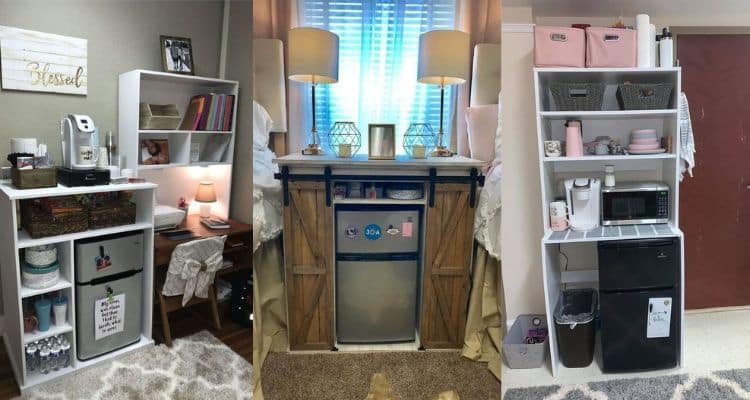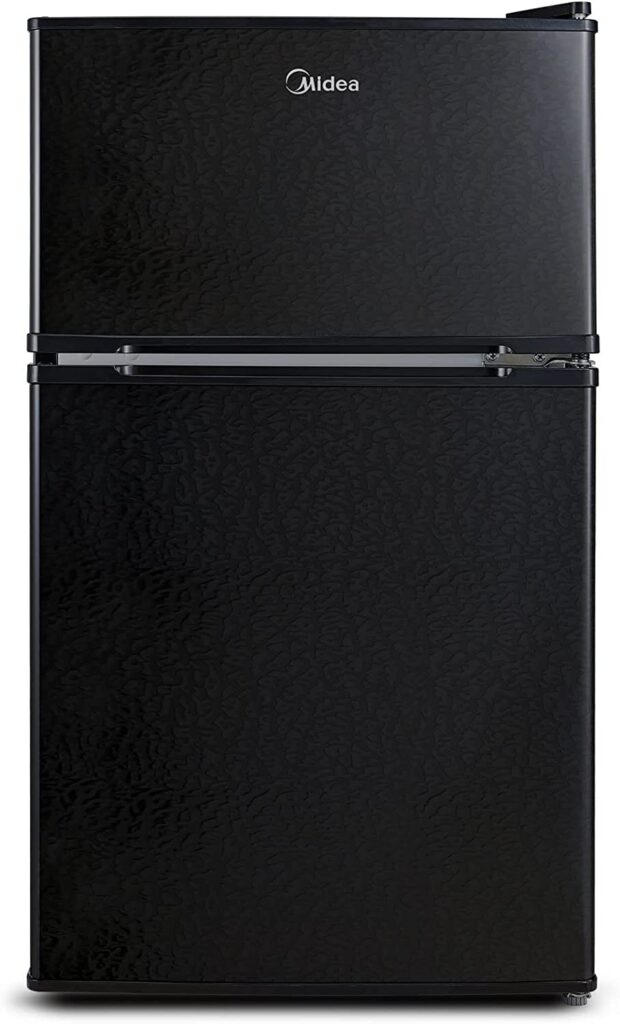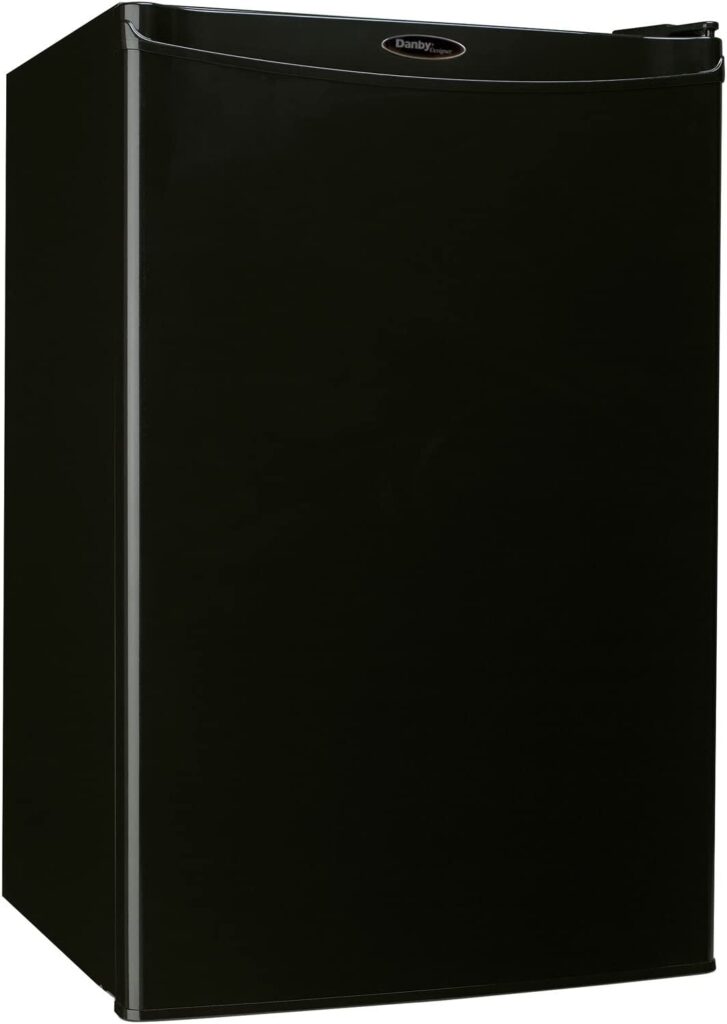Wondering if you can have mini-fridge in your dorm room? This post is all about college dorm room mini-fridges.

For many students, moving away to college is an exciting time filled with new experiences and challenges. What to bring to your college dorm room? While many schools provide basic furniture like beds and desks, you’ll still need plenty of things. One of the most common items students bring is a mini fridge. Are mini-fridges allowed in college dorms?
It depends on the college’s policies. Some schools allow mini-fridges as long as they meet certain size and safety requirements, while others prohibit them. It’s important to check with your college before bringing one.
This question is one that many students and parents ask as they prepare for move-in day. Some schools have strict policies on what students can and cannot bring into their dorm rooms, and mini-fridges may be on the list of prohibited items.
However, other schools allow mini-fridges if they meet certain sizes and safety requirements. In this article, we’ll explore the rules and regulations surrounding mini-fridges in college dorms and provide some recommendations for the best mini-fridges to bring with you to school.
The Importance of Mini Fridges in College Dorms
College dorm rooms are often small, shared spaces where students live, eat, study, and relax. A mini fridge can make a big difference in convenience, comfort, and health. Here are some reasons why mini-fridges are important in college dorms:
- Saves Time and Money: With a mini fridge in your room, you can store snacks, drinks, and leftovers, which means you don’t have to leave your dorm room every time you want to eat or drink something. This can save you time and money by avoiding costly vending machines or ordering food delivery.
- Provides Healthy Options: A mini fridge allows you to store healthy foods and drinks like fresh fruits, vegetables, yogurt, and bottled water. This can help you maintain a balanced diet and avoid the temptation of unhealthy snacks.
- Enables Late-Night Studying: When you have a mini fridge in your room, you can store energy drinks or snacks to help you stay awake and focused during late-night study sessions.
- Creates a Homey Atmosphere: Adding a mini fridge to your dorm room can make it feel more like home and give you a sense of independence and control over your living space.
A mini fridge in your college dorm can make your life more comfortable and convenient while helping you save time and money and promote healthy eating habits.
Related posts you may like: 10 Ways to Organize Your Food in a Dorm Room Mini Fridge
Understanding College Policies on Mini Fridges
College policies regarding mini-fridges vary from school to school. Some colleges allow mini-fridges in dorm rooms, but they may have specific requirements on size and safety features. For example, some schools may limit the size of mini fridges to 3.6 cubic feet or less, while others may require that mini fridges be equipped with automatic shutoff switches or temperature control devices.
Additionally, some schools may prohibit mini-fridges, such as those with built-in freezers, propane, or other flammable fuels.
It’s important to understand your college’s policies on mini fridges before bringing one to your dorm room. You can find this information on your school’s housing website or by contacting your housing office.
Violating your school’s policies on mini fridges can result in disciplinary action, fines, or even the confiscation of your mini fridge. Therefore, it’s essential to carefully read and follow your school’s policies on mini fridges to avoid any potential issues.
Pros and Cons of Having a Mini Fridge in Your Dorm Room
Having a mini fridge in your dorm room can be a convenient and practical addition, but there are also some potential drawbacks. Here are some pros and cons of having a mini fridge in your dorm room:
Pros:
- Convenience: With a mini fridge in your room, you can easily store and access snacks, drinks, and leftovers without leaving your dorm room.
- Cost-Effective: Investing in a mini fridge can be a cost-effective way to save money on food and beverages. You can stock up on groceries and drinks, avoiding buying expensive vending machine snacks.
- Healthy Eating: A mini fridge can help promote healthy eating habits by allowing you to store fresh fruits, vegetables, and other healthy foods.
- Personalization: Adding a mini fridge to your dorm room can help personalize and enhance your living space. You can decorate it with stickers or magnets and make it feel your own.
Cons:
- Space Constraints: Dorm rooms are often small, and adding a mini fridge can take up valuable space, making it difficult to move around and organize your belongings.
- Noise and Energy Consumption: Some mini fridges can be noisy and consume much energy, leading to higher electricity bills and potential distractions while studying or sleeping.
- Safety Concerns: Mini fridges can pose safety risks if not maintained properly. Overcrowding or placing them in areas with poor ventilation can increase fire risk or overheating.
- School Policies: As mentioned earlier, some colleges may have specific policies on using mini-fridges in dorm rooms, which can result in disciplinary action.
Having a mini fridge in your dorm room can be beneficial, but it’s important to consider the pros and cons before deciding.
Related posts you may like: How to Hang a Hammock in a Dorm Room? (With Videos)
Top 5 Mini Fridges for College Students
If you’re considering bringing a mini fridge to your college dorm room, choosing one that fits your needs and budget is important. Many mini-fridges are available on the market, each with its features and specifications. To help you make an informed decision, we’ve compiled a list of the top 5 mini fridges for college students.
- Midea WHD-113FB1
The Midea WHD-113FB1 is an excellent mini fridge for college students for several reasons. First and foremost, it has a spacious 3.1 cubic feet capacity, making it ideal for storing snacks, drinks, and small food items. Additionally, it has a separate freezer compartment, allowing you to freeze items like ice cream, frozen meals, or ice packs for injuries.
The Midea WHD-113FB1 is also energy-efficient, making it a great choice for college students who want to keep their energy bills low. It has an adjustable temperature control feature, which allows you to customize the temperature to your liking, and it’s also equipped with an automatic defrost feature, making maintenance a breeze.

- BLACK+DECKER BCRK25B Compact Refrigerator
The BLACK+DECKER BCRK25B Compact Refrigerator is an ideal mini fridge for college students who need a compact and functional refrigerator in their dorm rooms. With a capacity of 2.5 cubic feet, it’s a great choice for students who don’t need much storage space or have limited room space. The removable shelves make it easy to customize the interior to fit your needs, and the reversible door allows for convenient placement in your room.
One of the best features of the BLACK+DECKER BCRK25B is its energy efficiency. It’s Energy Star certified, which means it meets strict energy efficiency guidelines set by the US Environmental Protection Agency. This translates to lower energy bills and less impact on the environment.
Additionally, it has an adjustable thermostat control, so you can customize the temperature to your liking. Its compact size, efficient design, and affordability make it an excellent option for college students who need a reliable and energy-efficient mini fridge that won’t take up too much space.

- Danby DAR044A4BDD-3
The Danby DAR044A4BDD-3 is an excellent mini fridge for college students who need more storage space than a smaller mini fridge can offer. Its 4.4 cubic feet capacity makes it spacious enough to store various food and drink items, including larger bottles and containers. It also has a bright interior light, which makes it easy to see the contents inside. It features an adjustable mechanical thermostat, which allows you to customize the temperature to your liking, and an automatic defrost feature, making maintenance a breeze.
Another great feature of the Danby DAR044A4BDD-3 is its energy efficiency. It’s Energy Star compliant, which meets strict guidelines set by the US Environmental Protection Agency. This translates to lower energy bills and less impact on the environment. The Danby DAR044A4BDD-3 also has a compact design, making it easy to fit into most dorm rooms without too much space.

- RCA RFR322-B 3.2 Cu Ft Single Door Mini Fridge
The RCA RFR322-B 3.2 Cu Ft Single Door Mini Fridge is a sleek and stylish option for college students who want a larger mini fridge with more storage capacity. Its capacity of 3.2 cubic feet makes it perfect for students who want to store more food and drink items in their dorm rooms. It features adjustable temperature control, a built-in freezer compartment, and a reversible door, allowing convenient placement in your room.
Another great feature of the RCA RFR322-B is its low noise level, making it a great choice for students who want a quiet mini fridge that won’t disturb their studies or sleep. It’s also energy efficient, with an Energy Star rating, which means it meets strict energy efficiency guidelines set by the US Environmental Protection Agency. It has a compact design, making it easy to fit into most dorm rooms, and it’s also easy to clean and maintain.
- Cooluli Mini Fridge Electric Cooler and Warmer
The Cooluli Mini Fridge Electric Cooler and Warmer is a versatile and portable option for college students who want a mini fridge they can take on the go. Its 4-liter capacity is perfect for storing snacks, drinks, and small food items. One of its best features is its ability to switch from cooling to warming mode, making it ideal for keeping food and drinks warm or cold as needed.
Another great feature of the Cooluli Mini Fridge is its portability. It’s small and lightweight, making it easy to transport to and from class, the library, or anywhere else you need to go. It’s also USB powered, so you can plug it into your laptop or power bank conveniently. Despite its small size, the Cooluli Mini Fridge is powerful and efficient, with low noise levels and an eco-friendly design.

Related posts you may like: Can You Light A Candle In A Dorm? 5 Alternatives
Factors to Consider When Choosing a Mini Fridge
When choosing a mini fridge for your college dorm room, there are several factors to consider. Here are some of the most important factors:
- Size: Consider the space in your dorm room and the storage space you need for your food and drinks. Mini fridges come in different sizes, ranging from 1.6 cubic feet to 4.5 cubic feet, so choose one that meets your storage needs and fits in your dorm room.
- Energy Efficiency: Look for mini fridges with an Energy Star certification, which means they meet strict energy efficiency guidelines set by the US Environmental Protection Agency. An energy-efficient mini fridge can help you save money on your energy bills while reducing your environmental impact.
- Noise Level: Some mini fridges can be noisy, and distracting when studying or sleeping. Look for models with low noise levels or sound-dampening features.
- Features: Consider the features you need, such as adjustable temperature control, automatic defrost, built-in freezer compartment, reversible door, and interior lighting.
- Price: Mini fridges come in different ranges, so consider your budget when choosing one. While a higher price tag may indicate better quality and features, there are also affordable options that offer good value for money.
When choosing a mini fridge for your college dorm room, consider your storage needs, energy efficiency, noise level, features, and budget to make an informed decision.
Tips for Maintaining Your Mini Fridge in Your Dorm Room
Maintaining your mini fridge is essential to ensure it runs efficiently and lasts long. Here are some tips for maintaining your mini fridge in your dorm room:
- Clean It Regularly: Wipe down the interior and exterior of your mini fridge with a damp cloth to remove any dirt, dust, or spills. Avoid using harsh chemicals or abrasive materials that can damage the fridge’s surface.
- Defrost It When Necessary: If your mini fridge has a freezer compartment, defrost it regularly to prevent ice buildup, affecting the fridge’s performance. Follow the manufacturer’s instructions for defrosting.
- Keep It Full: A mini fridge works more efficiently when it’s full, so keep it stocked with food and drinks. However, don’t overcrowd it, as this can affect airflow and cooling.
- Check the Temperature: Ensure the temperature inside your mini fridge is set correctly. A temperature range of 35°F to 40°F is ideal for storing food and drinks.
- Keep It in a Well-Ventilated Area: Avoid placing your mini fridge in a cramped or poorly ventilated area, as this can affect its performance. Keep it in a well-ventilated area, and ensure enough space around it for proper airflow.
By following these tips, you can ensure that your mini fridge runs efficiently, stays clean and fresh, and lasts for a long time, making it a worthwhile investment for your college dorm room.
Related posts you may like: Are Guys Allowed In Girls’ Dorms? (What to Know)
Making the Decision to Bring a Mini Fridge to College
Deciding whether or not to bring a mini fridge to college is a personal choice that depends on your individual needs and circumstances. There are several factors to consider, such as your storage needs, budget, school policies on mini-fridges, and the available space in your dorm room. If you need to store food and drinks in your dorm room, a mini fridge can be a convenient and cost-effective solution. It can also help you save money on expensive vending machine snacks and allow you to keep healthy foods readily available.
However, it’s important to remember that mini-fridges can also take up valuable space in your dorm room and may require additional maintenance and energy costs. Additionally, some schools have strict policies on using mini-fridges in dorm rooms, which can result in disciplinary action. Ultimately, the decision to bring a mini fridge to college should be based on your personal needs and preferences and your school’s policies and regulations. Consider the pros and cons, as well as your budget and storage needs, before deciding.




